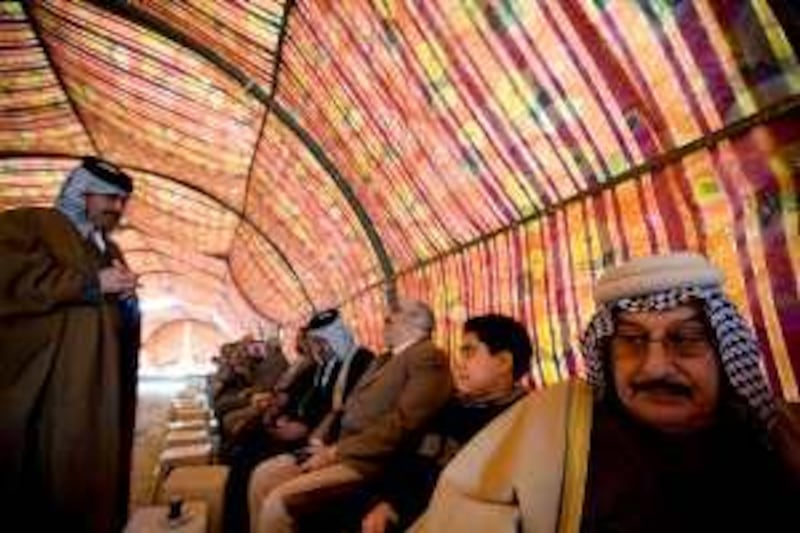KUT, IRAQ // Corrupt and incompetent political parties are causing democracy in Iraq to fail, according to the leader of one of its most powerful tribes. Despite significant improvements in the security situation since 2007 and last month's elections, widely hailed as successful, Sheikh Rabea'a Mohammed al Habeeb warned that political freedoms were being strangled. "Politically speaking, we are sinking deeper and deeper," he said in an interview at a tribal gathering in Kut, 170 km south-east of Baghdad. "We have hundreds of political parties and none of them want to serve the people or the country. "The parties that are elected represent no more than five per cent of the population." Sheikh Rabea'a, who was educated in England and stands at the pinnacle of Iraq's tribal aristocracy, said years of sanctions and war have made the Iraqi people a "ticking time bomb" that could explode again unless real improvements are made quickly to their living conditions. Millions of Iraqis continue to live in serious poverty, while most of the population suffers from high unemployment, undrinkable water, patchy electricity and poor medical treatment. Corruption is rampant, which has enabled a tiny minority to amass enormous fortunes. "The elections are in themselves something good, but serious questions remain about the people who are elected," he said. "Democracy in Iraq at the moment is seen by certain parties as a way of getting as much money as they can as quickly as they can. No one has actually done anything constructive." He claimed that political parties with millions of dollars in their coffers "can just buy votes", which is how they get elected - "not because they have honest intentions". "Iraq is like a sick man at the moment. It needs good medical treatment, not an unqualified doctor." Sheikh Rabea'a said Iraq is not ready to have a democratic system of government because ordinary people do not understand how one functions and become disillusioned when promises that were made are not delivered. Persistent failures could make the country turn its back on ideals of democratic governance, he said. "Before the days of Saddam and the Baath Party we had a democracy in Iraq and it worked well," he said. "But things have changed since then - the country has been corrupted, it has suffered decades of decline. That will take time to remedy and I'm not sure democracy will do that. Democracy is good when you have educated, intellectual people, but it doesn't serve us well at the moment." Sheikh Rabea'a, whose tribe spans much of southern and western Iraq, as well as reaching into neighbouring Arab states, also blamed tribal leaders for failing in their duties. "We are a tribal people in many ways, but we have not organised ourselves," he said. "The tribes in southern Iraq in particular have not been organised and that has been our big mistake. We could have been more involved, we could have stood in the elections and make sure that competent, honest people were elected. "At the moment we haven't done that. I'm sure there will be a change in the future." His bleak assessment is far from universally shared. Many Iraqis, as well as western political analysts, saw the January elections as a positive step forward for Iraqi democracy. Some of the big, incumbent blocs, particularly the Islamic Supreme Council of Iraq, were thrown out of power in a series of provinces, with people voting for a change after four years of ineffectual leadership. In Kerbala, home of some of Shia Islam's most sacred sites, voters even chose a former Baathist, Yousef al Haboobi, part of the coalition of the prime minister, Nouri al Maliki, over the religious parties. Although he ran a low-cost, low-key campaign and was smeared as being an ally of Saddam Hussein, Mr al Haboobi won grassroots support because of his reputation as a competent technocrat. Although detailed election results have still not been realised, Mr al Maliki's group performed well, winning in two of Iraq's biggest cities, Baghdad and Basra. Sheikh Rabea'a was unconvinced however, and said a tribal council should be established to act as a watchdog on the government. "A tribal council, of 10 or 15 prominent sheikhs would be good for the country," he said. "They would not be interested in money - they have enough - and they just want to see the general living conditions of their people improved. This is a rich country and we have enough for people to live good, comfortable lives, like in the Gulf states. "I don't think the politicians in Iraq would want such a thing because it would be like a guard; it would be watchful eyes on what is happening, it would stop this corruption." psands@thenational.ae
'Iraq is like a sick man at the moment'
Tribal leader warns that widespread corruption and incompetence are bringing about the demise of the country's fledgling democracy.

More from the national




